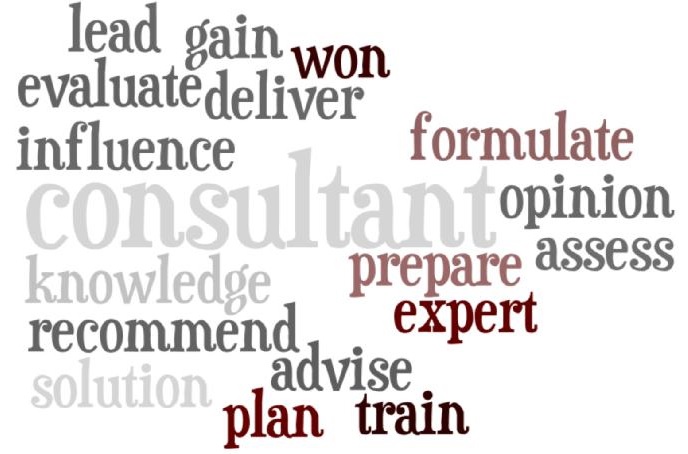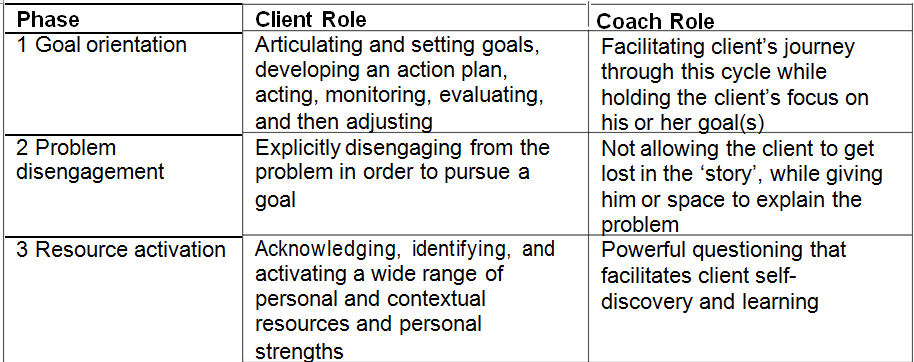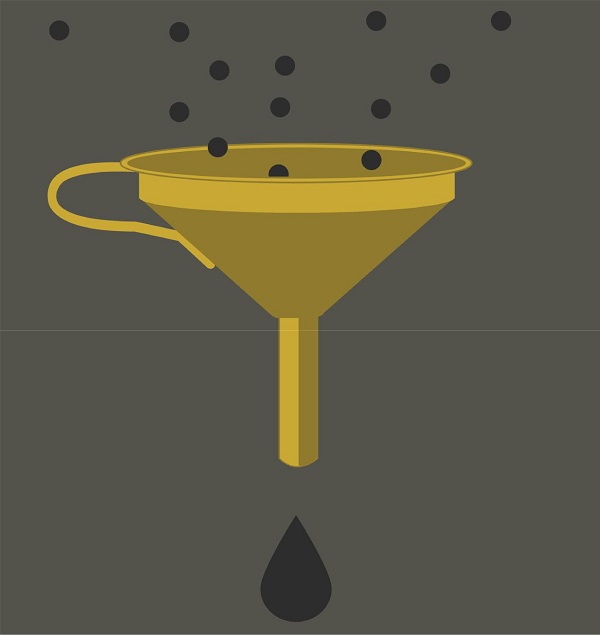A Coaching Model Created by Greta Boye
(Career and Life Coach, UNITED STATES)
Background and understanding
Many things these days are considered to be hybrids, or combinations: cars (Toyota Prius), food (brocco flower), and animals (Golden doodle dogs) are well-known examples. When it comes to professional services like coaching, a hybrid can also be created by blending consulting with coaching, and coining it consultative coaching. Taken independently, the two words are very different.
The International Coach Federation (ICF) defines coaching as
partnering with clients in a thought-provoking and creative process that inspires them to maximize their personal and professional potential.
Merriam-Webster dictionary defines consulting as
providing professional or expert advice.
 Indeed, words used to describe these two professions are vastly different from one another. Let us consider words taken from a typical consultant’s resume (see left) and note that they tend to focus on actions that she takes on behalf of the client. As a result of working with her client, a consultant usually feels that she is the person delivering the solution to a stated problem; in effect, she is the one taking action.
Indeed, words used to describe these two professions are vastly different from one another. Let us consider words taken from a typical consultant’s resume (see left) and note that they tend to focus on actions that she takes on behalf of the client. As a result of working with her client, a consultant usually feels that she is the person delivering the solution to a stated problem; in effect, she is the one taking action.
 In contrast, words that appear on a coach’s resume (see right) nearly reflect opposite actions when compared with those associated with a consultant. Rather than the coach finding the solution, she facilitates the client to find it on her own. The client is the one who takes the action. Rather than the coach claiming success to a solution, a measure of her success is that she poses thought-provoking questions that help the client find answers on her own.
In contrast, words that appear on a coach’s resume (see right) nearly reflect opposite actions when compared with those associated with a consultant. Rather than the coach finding the solution, she facilitates the client to find it on her own. The client is the one who takes the action. Rather than the coach claiming success to a solution, a measure of her success is that she poses thought-provoking questions that help the client find answers on her own.
With such stark differences between consulting and coaching, one might wonder how they could possibly be combined. One potential definition of consultative coaching could be
provoking thoughtful discussion with clients while offering expert advice to bring about personal or professional change.
However, this definition does not seem to do justice to the profession of coaching, perhaps because modern-day coaching has been around only since 1991 and is still evolving (ICA, 2015).
In fact, only two-thirds of respondents of a recent ICF survey (n=15,000) indicated that they were very aware or somewhat aware of the field of professional Business and/or Life Coaching, and of those respondents only 30 percent chose the ICF definition of coaching (ICF, 2017). In contrast, management consulting can be traced back to the turn of the 20th century, a time when large U.S. industrial organizations created a market for expertise in the areas of engineering, accounting, and law (McKenna, 1995). This longevity likely explains why most people understand modern-day consulting simply as providing expert advice to solve a problem. So it is somewhat logical that creating a definition of consultative coaching that reflects the spirit of coaching could take some time, even though most people might understand in general terms that it is a hybrid of consulting and coaching.
Model
The solution-focused approach to consulting, as described by Grant (2016), can be applied to the concept of consultative coaching. With origins from psychotherapy, and specifically solutions -based therapy, a solution-focused coaching conversation typically follows three phases:

Grant goes on to explain that this model is not without criticism. Some argue that this model is absent of a theory and is simply based on a coach’s ability to ask the right questions that facilitate the client to arrive at a solution. Others find that no expert knowledge or skills are needed to use this approach effectively.
Application
Consultative coaching could satisfy critics and proponents alike of the solutions-focused model. Questions, as Grant explains, lie on a dimension, from being non-directive (e.g., ‘What is the most useful step you could take next?’) to directive (‘Other people have found X and Y to be very helpful, because of Z. Could this work for you?’). Non-directive questions clearly reflect ‘pure’ coaching as defined by the ICF; directive questions clearly reflect consulting according to dictionary definitions. In my experience as a coach, albeit it limited, and as a consultant (very experienced with more than 25 years), I tested consultative coaching with several clients and found that the following steps worked best for the client, and for me as the coach.
- In the discovery session, be clear on what is and what is not coaching, and do the same for consulting. Then explain situations where a hybrid of the two could be appropriate. Continue to explain the difference offer examples of questions, as above, and ask the client if they are interested in this blended approach.
- If the client would like to pursue a consultative coaching agreement, include that statement in his or her contract that lays out your approach to coaching, along with the standard language on expectations from the client and the coach, and the terms of the coaching relationship.
- Likewise, if the client would like to pursue this type of coaching, remind him or her of it as you structure each coaching session. I find that it is best to state this approach after talking about confidentiality and before the client defines the topic, objective, motivation for topic, and measures of success.
- During the coaching session, I have realized that the frequency of asking direct questions, or offering advice, depends on timing and the degree to which the client appears to be “stuck”. Following the foundation of ICA training, my golden rule is to always “ask much, much more than tell, if at all”. I also found that clients who work in the same industry as I do (international economic development, a specialized field of consulting) typically ask me about my experience and what options they are missing that appear evident to me. In all cases, I have adopted ICA and ICF recommendation to first ask if I can be direct in relaying my own experience or a possible solution. Clients typically welcome it.
Coaching and consulting skills needed for the Consultative

Coach
In her article on blending consulting and coaching, Belles (2000) postulates that
an effective consultant has well-developed coaching skills and an effective coach has well-developed consultative skills.
She expands upon the skills topic by stating that in each interaction with a client, consultants and coaches are required to make judgment calls regarding the appropriate consulting or coaching strategies that provide optimum benefits to the client.
As I reflect on the skills gained over a long-term consulting career, and those that I am developing as a coach, I think of a funnel. In the figure above, the drops represent my skills – consulting and coaching. Combined, they become a blend. However, the dynamics that are taking place in the moment of the coaching session will depend on the content of the blend that I offer in that moment. In other words, if I feel that I need to accelerate the process because a client is stuck, or that I can add value from my experience, I could use more consulting skills in that moment than coaching skills. In contrast, if non-directive questioning is helping the client to move closer to his or her goal, I continue along that dimension. In either case, the basis of consultative coaching, as with all coaching, is the assumption that clients themselves hold the answers to their issues. The (consultative) coach is simply a partner in the process of figuring it all out.
References
Belles, C. C. (2000). Blending consulting & coaching for real value. Retrieved from https://www.sageleaders.com/wp-content/uploads/2009/03/CheryBelles.pdf
Grant, A. M. (2016). Solution-focused coaching. In J. Passmore Editor Excellence in coaching: The industry guide (112-130). London: Kogan Page Limited.
International Coach Academy. (ICA, 2015). History of coaching. Retrieved from
International Coach Federation. (ICF, 2017). 2017 ICF Global consumer awareness study.
Executive summary. Retrieved from
https://www.coachfederation.org/about/landing.cfm?ItemNumber=4456
McKenna, C. D. (1995). The origins of modern management consulting. In Business and economic history, volume 24, no. 1, Fall 1995. Retrieved from: http://www.thebhc.org/sites/default/files/beh/BEHprint/v024n1/p0051-p0058.pdf